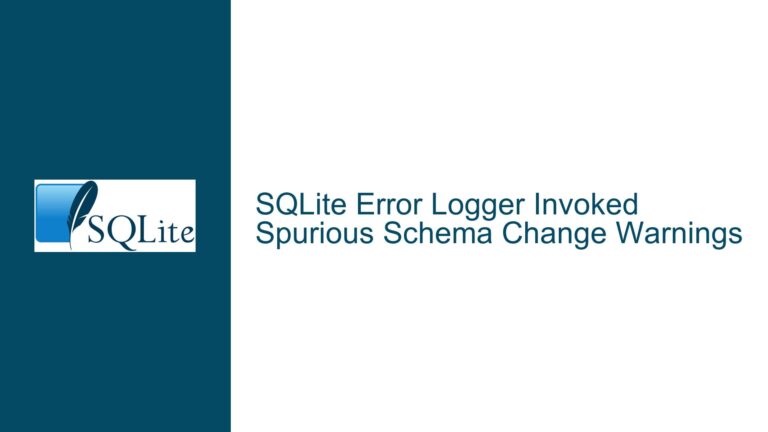ODBC Virtual Table Issues: NULL Columns and Quoted Arguments in SQLite
ODBC Virtual Table Implementation and NULL Column Issues
When implementing an ODBC virtual table in SQLite, one of the primary challenges is ensuring that data fetched from the ODBC driver is correctly mapped to the SQLite virtual table. In the provided scenario, the user encountered a specific issue where a WHERE clause condition on a column (e.g., column3 = 4) resulted in the column values being NULL in the result set, even though the data was not NULL when fetched from the ODBC source. This issue is particularly perplexing because the query without the WHERE clause works as expected, returning the correct data.
The root of this problem lies in how the ODBC driver handles cursor movement and data retrieval. SQLite’s virtual table mechanism expects to fetch data in a specific way, and if the ODBC driver does not align with these expectations, data inconsistencies can arise. Specifically, the ODBC driver’s default cursor behavior may not be compatible with SQLite’s virtual table implementation, leading to incorrect data retrieval when filtering or sorting is applied.
Additionally, the user noted that the argv values passed to the xCreate function are quoted (e.g., 'ABC' instead of ABC). This behavior is unusual and suggests that the ODBC driver or the virtual table implementation is adding quotes to the arguments, which can interfere with the correct parsing and execution of the SQL statements.
ODBC Cursor Behavior and Column Data Retrieval
The core issue with the NULL values in the result set stems from the ODBC driver’s cursor behavior. By default, ODBC drivers may use a forward-only cursor, which is not suitable for the random access pattern that SQLite employs when executing queries with WHERE clauses or other filtering conditions. When SQLite requests data from a specific column after moving the cursor, the ODBC driver may fail to reset the cursor position correctly, resulting in NULL values being returned.
To address this, the cursor type must be explicitly set to SQL_CURSOR_KEYSET_DRIVEN in the odbcOpen function. This cursor type allows for bidirectional movement, enabling SQLite to fetch data in any order without losing track of the current row. The following code snippet demonstrates how to set the cursor type:
int rc = SQLAllocHandle(SQL_HANDLE_STMT, pTab->hConn, &(pCur->hStmt));
if (rc != SQL_SUCCESS && rc != SQL_SUCCESS_WITH_INFO)
return SQLITE_ERROR;
SQLSetStmtAttr(pCur->hStmt, SQL_ATTR_CURSOR_TYPE, (SQLPOINTER)SQL_CURSOR_KEYSET_DRIVEN, 0);
rc = SQLExecDirect(pCur->hStmt, (SQLWCHAR*)pTab->query, SQL_NTS);
Furthermore, the odbcColumn function must reset the column position before fetching data. SQLite may request column data multiple times and in random order, which can cause the ODBC driver to return SQL_NO_DATA if the cursor position is not reset. The following code snippet shows how to reset the cursor position using SQLSetPos:
SQLLEN res = 0;
SQLSetPos(pCur->hStmt, 1, SQL_POSITION, SQL_LOCK_NO_CHANGE);
int rc = SQLGetData(pCur->hStmt, colNo + 1, SQL_WCHAR, val16, MAX_DATA_LENGTH * sizeof(TCHAR), &res);
Finally, the odbcFilter function must re-execute the SQL statement to reset the cursor position. This ensures that the cursor is properly initialized before fetching data for the filtered result set. The following code snippet demonstrates how to re-execute the SQL statement in odbcFilter:
static int odbcFilter(sqlite3_vtab_cursor *cur, int idxNum, const char *idxStr, int argc, sqlite3_value **argv) {
odbc_cursor *pCur = (odbc_cursor *)cur;
SQLFreeHandle(SQL_HANDLE_STMT, pCur->hStmt);
SQLAllocHandle(SQL_HANDLE_STMT, pTab->hConn, &(pCur->hStmt));
SQLSetStmtAttr(pCur->hStmt, SQL_ATTR_CURSOR_TYPE, (SQLPOINTER)SQL_CURSOR_KEYSET_DRIVEN, 0);
SQLExecDirect(pCur->hStmt, (SQLWCHAR*)pTab->query, SQL_NTS);
odbcNext(cur);
pCur->rowId = 1;
return SQLITE_OK;
}
Handling Quoted Arguments in ODBC Virtual Table Creation
The issue of quoted arguments in the xCreate function is another significant challenge. When creating a virtual table, SQLite passes the arguments to the xCreate function as strings. However, if these arguments are quoted (e.g., 'ABC' instead of ABC), it can interfere with the correct parsing and execution of the SQL statements.
To resolve this, the quotes must be removed before passing the arguments to the ODBC driver. The following code snippet demonstrates how to remove quotes from the arguments:
TCHAR quotes[] = TEXT("\"'`[");
TCHAR* dsn = utf8to16(argv[3]);
if (!_tcschr(quotes, dsn)) {
dsn[0] = TEXT(' ');
dsn[_tcslen(dsn) - 1] = TEXT(' ');
}
This code checks if the argument contains any quotes and removes them if necessary. This ensures that the arguments are correctly parsed and passed to the ODBC driver without interference.
Conclusion and Best Practices for ODBC Virtual Tables in SQLite
Implementing an ODBC virtual table in SQLite requires careful attention to the ODBC driver’s cursor behavior and the handling of arguments passed to the xCreate function. By setting the cursor type to SQL_CURSOR_KEYSET_DRIVEN, resetting the cursor position before fetching data, and removing quotes from arguments, you can ensure that the virtual table works correctly and returns the expected results.
Additionally, it is essential to thoroughly test the virtual table implementation with various queries, including those with WHERE clauses and other filtering conditions, to ensure that the data is correctly mapped and retrieved. By following these best practices, you can avoid common pitfalls and create a robust and reliable ODBC virtual table in SQLite.






